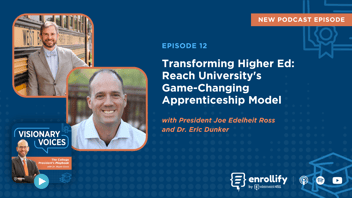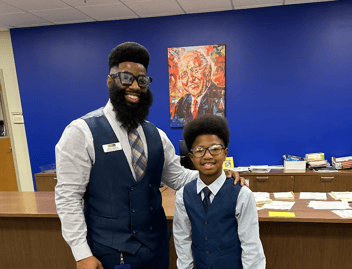Futuro Health's WorkforceRx Podcast | Turning Jobs into Degrees

Reach University President, Joe E. Ross, joined Van Ton-Quinlivan, CEO of Futuro Health and host of WorkforceRx, to discuss how Apprenticeship Degrees are shaping the future of learning, work, and care.
Together, Van and Joe dive into how to define an Apprenticeship Degree; how job-embedded programs are funded to ensure learner affordability; how liberal arts courses can be integrated into the greater workplace experience; and how Reach envisions bringing this barrier-free model to sectors beyond K-12 education, such as the behavioral health and healthcare sectors.
A brief overview of key episode takeaways can be found below. To listen to the full episode and read the transcript, please visit: https://futurohealth.org/podcast/joe-e-ross-president-of-reach-university-turning-jobs-into-degrees
Key Takeaways:
1. What is an Apprenticeship Degree?
-
Apprenticeship Degree is a "job first and foremost that’s paid and that is paired with some type of related instruction and some mentorship with the ultimate objective of the apprentice, the learner, obtaining a credential of some kind and then a promotion in their field without having to leave their home or their community and certainly without having to get out of the workforce to get ahead."
-
An Apprenticeship Degree is "also a fully accredited degree. Reach University is accredited by the same accreditor that accredits Stanford and University of California. It is not a bachelor apprenticeship, it’s a bachelor of arts. It’s not an associate apprenticeship, it’s an associate of arts, but it’s delivered in the context of the workplace being the campus."
- Apprenticeship Degree follows three key tenets, the ABCs: 1) It's Affordable. The learner is paid from day 1 through graduation and the program is offered at a low-to-no cost to the learner, generally without student loan debt; 2) It's Employer-based and the learner's place of employment becomes the primary place of learning; and 3) It offers Credit for the work the degree seeker does on the job.
2. What are the key challenges for peer colleges in developing Apprenticeship Degrees?
- Assessing On-the-Job Learning: Designing valid systems to evaluate and grant credit for workplace learning is crucial.
- Building Workplace Partnerships: Most universities are unaccustomed to collaborating closely with employers on program design, recruitment, and student support. Apprenticeship Degrees change this dynamic.
- Ensuring Affordability: Creating high-quality programs that remain affordable requires innovative strategies like awarding credit for work, cohort-based cost efficiencies, and leveraging innovative faculty models, such as "professors of practice."
Reach University's National Center for the Apprenticeship Degree (NCAD) offers playbooks and resources in overcoming each challenge.
3. The Power of Apprenticeship Degrees Across Sectors
- These Apprenticeship Degrees address both job shortages and workforce diversity in fields like behavioral health, where an apprenticeable job (on-the-job learning) intersects with a degreeable job (where a degree is required or valuable).
- For example, pairing associate degrees with entry-level service roles can lead to bachelor's and eventually master's degrees in high-need fields like social work, enabling long-term career progression.
4. Early Indicators of Reach's Apprenticeship Degree
- High Semester-to-Semester Retention Rates: Over 90% semester-to-semester retention demonstrates the success of combining education with meaningful employment in learners' home communities.
- Graduate Employment: Nearly all graduates transition directly into jobs, with some contributing to the university itself.
- Workforce Representation Matches: Apprenticeship Degrees are helping the workforce better reflect the demographics of the communities served, especially in education and healthcare sectors.
Listen to the full interview wherever you get your podcasts:
https://futurohealth.org/podcast/joe-e-ross-president-of-reach-university-turning-jobs-into-degrees/


